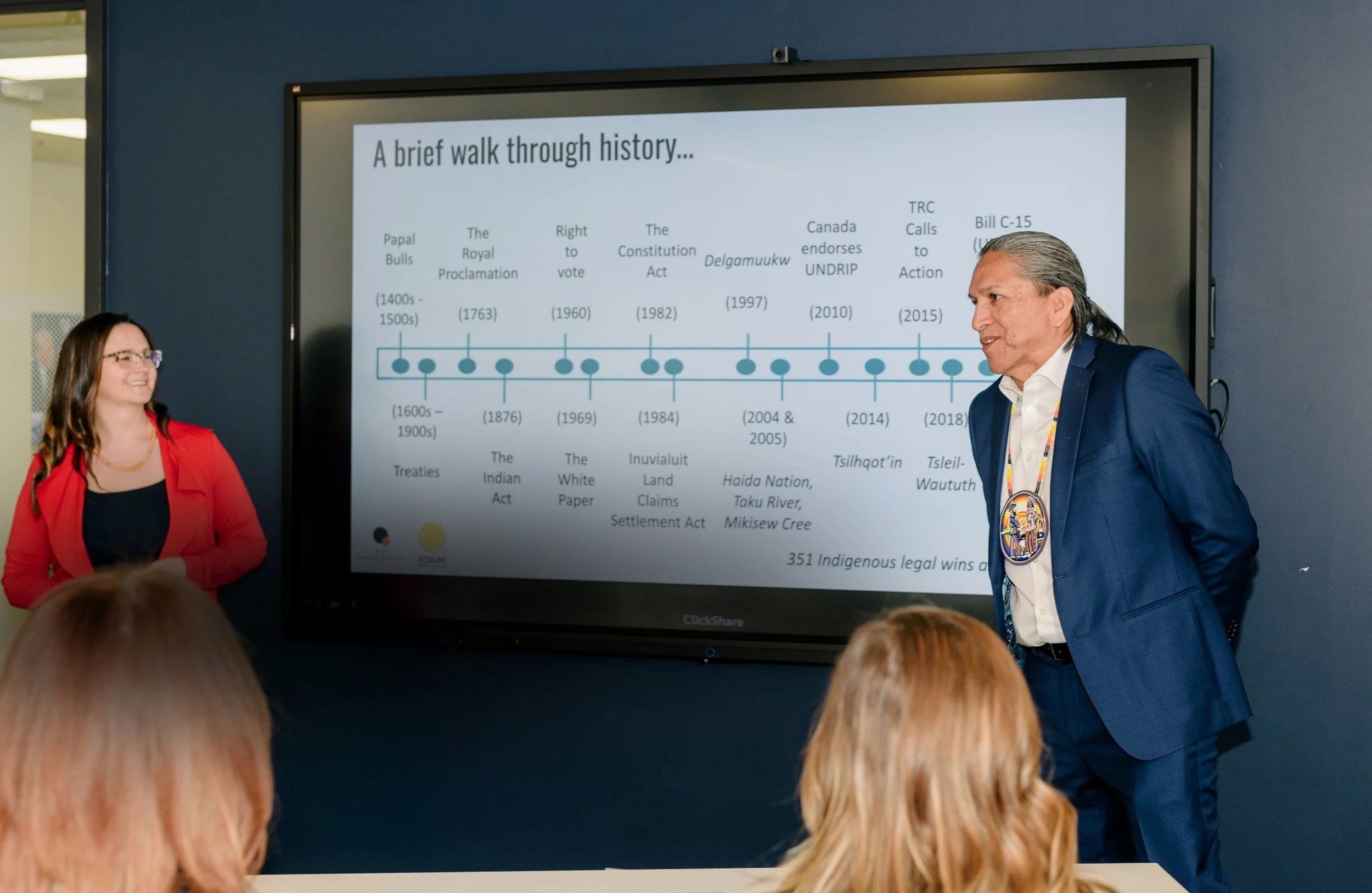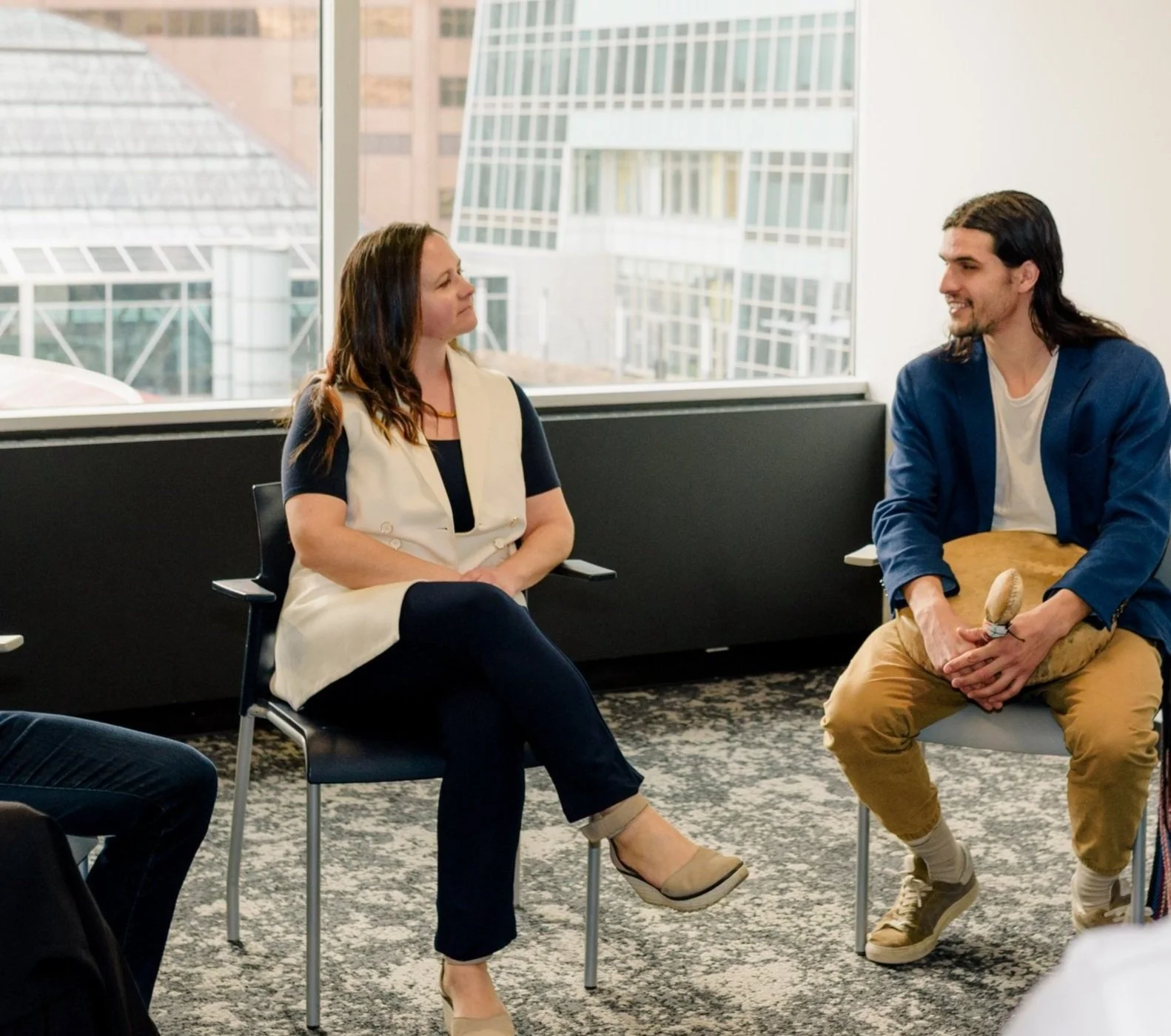
Indigenous Relations
Training for today’s workplace
“When we know
better, we do better.”
We believe that the path to a future where all Canadians have the opportunity to benefit and prosper from this great country starts with education about the shared history among Indigenous and all Canadians.
All of our Indigenous inclusion training is delivered by both Indigenous and settler presenters. Anne and her Indigenous partners believe that this co-creation approach provides a more holistic experience for training participants and effectively models reconciliation and right relations among Indigenous and all Canadians.
Our Indigenous Relations Training workshops are designed to meet your organization where it’s at—whether you're beginning your learning journey or looking to deepen existing knowledge. All workshops can be tailored to fit your team’s goals, sector, and level of experience. We also offer fully customized programs developed in partnership with you to address specific challenges, priorities, or audiences within your organization.
Read through the workshop descriptions below to get a sense of what we offer—and get in touch to explore which options are the right fit for your team.

KAIROS
Blanket Exercise
The KAIROS Blanket Exercise is a powerful, interactive workshop that will help you deepen your understanding of the shared history between Indigenous and non-Indigenous peoples in Canada. Through participatory learning, you’ll explore pre-contact, treaty-making, colonization, and resistance, fostering empathy and enhancing awareness.
Duration: 2.5 hours
Best for: 15-25 people
Delivered: In-person
-
In this workshop, you will actively engage with Canada’s history from an Indigenous perspective.
It will create space for you to reflect, connect, and engage in meaningful dialogue. By participating, your heart and mind will be opened as you consider your role in reconciliation and how you can help build a better future.
-
Opening: Begin with grounding activities, introductions, and role assignments to prepare for the exercise.
The Blanket Exercise: Step onto blankets representing the land and experience key moments in history to better understand the impacts of land loss, assimilation, and resistance.
Connecting to Lived Experience: Hear the personal story of a residential school survivor (live or recorded), and others affected by colonization to connect the historical narrative to our lives today.
Talking Circle: Reflect on what you’ve experienced and consider what you’ll do next.
-
"Thank you so much for making this kind of experience possible. It was very hard, emotional, and softening for me. It made things that happened before I was born much more tangible and opened me up to be able to better empathize."
“The Blanket Exercise made an experience that we are only learning the truth about now tangible in a space and time that makes it something quite adaptable to work and community environments. I was quite impressed how it truly made me feel and alter my perspective (and realize how much more I need to learn).”
Taking Action in Reconciliation Workshop
How will you move from understanding the Truth to taking meaningful action toward Reconciliation? Recommended as a follow up to the KAIROS Blanket Exercise, Reconciliation in Action is an interactive workshop that helps you turn learning into action by introducing practical frameworks and guiding you in creating personalized plans for both your personal and professional life.
Duration: 2 hours
Best for: 15-30 people
Delivered: In-person, online, or hybrid
-
This workshop empowers you to reflect on past learning and take actionable steps toward Reconciliation. With guidance from Indigenous and Settler trainers, you will:
Explore practical frameworks for reconciliation, such as mapping spheres of influence and action planning.
Identify personal and professional connections where you can create meaningful impact.
Develop a tangible and personalized reconciliation action plan to guide your next steps.
Whether you’re continuing from the KAIROS Blanket Exercise or starting fresh, this workshop provides tools and support to make a difference.
-
“Thank you for this investment in our learning. Conversations and experiences like this can only help us do our jobs better.”
“Time for reflection after the Blanket Exercise prepared me to come to this second session with real questions or actions I felt I could act upon going forward.”

Putting Words
Into Action
Land Acknowledgements 101:
Why do we do land acknowledgements and what makes them meaningful? This lunch and learn style workshop helps you go beyond reading a script to explore the history, purpose, and impact of land acknowledgements.
Duration: 50 to 75 minute
Best for: Good for any size from 5 - 100 people
Delivered: In-person, online, or hybrid
-
This workshop provides you with the tools and understanding to approach land acknowledgements with authenticity, respect, and intention. Co-delivered by Indigenous and Settler trainers, you will:
Explore the history, protocol, and purpose of land acknowledgements and their connection to reconciliation.
Reflect on your identity, the meaning behind your words, and your role as a beneficiary of colonization and treaties.
Develop a personal land acknowledgement framework and connect it to broader reconciliation actions.
With interactive activities and tangible outcomes, this workshop equips you to contribute to reconciliation in a thoughtful and impactful way.and how you can help build a better future.
-
“Going through this workshop with so many of our team members has changed the culture of how we think of land acknowledgements. People are excited about the chance to dig into their personal stories and share connections with colleagues as we recognize these lands.”
Exploring Economic Reconciliation
How can including Indigenous perspectives make Canada’s economy stronger? Exploring Economic Reconciliation looks at the history of Indigenous economies, the impact of colonization, and how we can create more opportunities for Indigenous inclusion in today’s economy.
Duration: 2 hours
Best for: 15-40 people
Delivered: In-person, online, or hybrid
-
This interactive session invites you to explore the history and future of Indigenous economic inclusion in Canada. Co-delivered by Indigenous and Settler trainers, the workshop covers:
The unique characteristics of thriving Indigenous economies before colonization.
The impacts of colonization on these economies and how they shaped Canada’s current economic landscape.
Opportunities to advance economic reconciliation, including the roles of individuals, governments, and businesses in fostering greater Indigenous inclusion.
Through thought-provoking discussions and expert insights, you’ll reflect on how including Indigenous perspectives can make our economy better for everyone and learn what actions you can take to support economic reconciliation.
-
"A very well done and engaging session. There was no down time, and the session felt like it flew by but was very well structured."

Custom Indigenous Awareness Training
Looking to create a foundational understanding about the history, experiences, and current interests of Indigenous Peoples in Canada to support your organization’s work in Indigenous relations and reconciliation? Forum Community Relations will work with you to design a workshop that meets the unique needs of your organization, offering a thoughtful exploration of our shared history and practical strategies for building respectful and meaningful relationships with Indigenous people and communities.
Duration: 4-6 Hours
Best for: Up to 25 People Maximum
Delivered: In-person, online, or hybrid
-
Custom Indigenous Awareness courses offer a comprehensive overview of Indigenous Peoples’ history and contemporary experiences in Canada. Delivered in a flexible format tailored to your organization’s needs, this interactive course covers:
The history of Indigenous Peoples in North America before and after contact.
The impacts of colonization, including government policies of assimilation and the Indian residential school legacy.
The current interests of Indigenous Peoples in Canada and their relationship to development and decision-making.
The importance of identity, land, and cultural connections in a contemporary context.
Key frameworks for reconciliation, such as the Truth and Reconciliation Commission Calls to Action, the United Nations Declaration on the Rights of Indigenous Peoples, and the National Inquiry into Missing and Murdered Indigenous Women and Girls.
Strategies for meaningful consultation and engagement with Indigenous communities.
This training is co-delivered by Indigenous and Settler facilitators and can be delivered in person or online. Participants will leave with a deeper understanding of Indigenous history and culture, as well as actionable strategies for fostering reconciliation and inclusion within their organization’s unique context.
-
Forum Community Relations has delivered custom Indigenous Awareness courses to municipalities, corporations, executive leaders, boards, and non-profit groups.
Here’s what some of the folks who took these courses had to say:
"Thank you for helping me see a different perspective. I wasn't taught about this in school, and I am glad children today are being taught about this. All we can do is have an open mind, learn, and do better. Nothing can right the wrongs of the past, but together we rewrite history to make the lives of all Indigenous People of Canada better.""I better understand how the land is important to Indigenous People. It's not just land as we might see it. But instead, some land is very important in that it may be an important place of ancestors buried, or places where ceremonies are celebrated."





